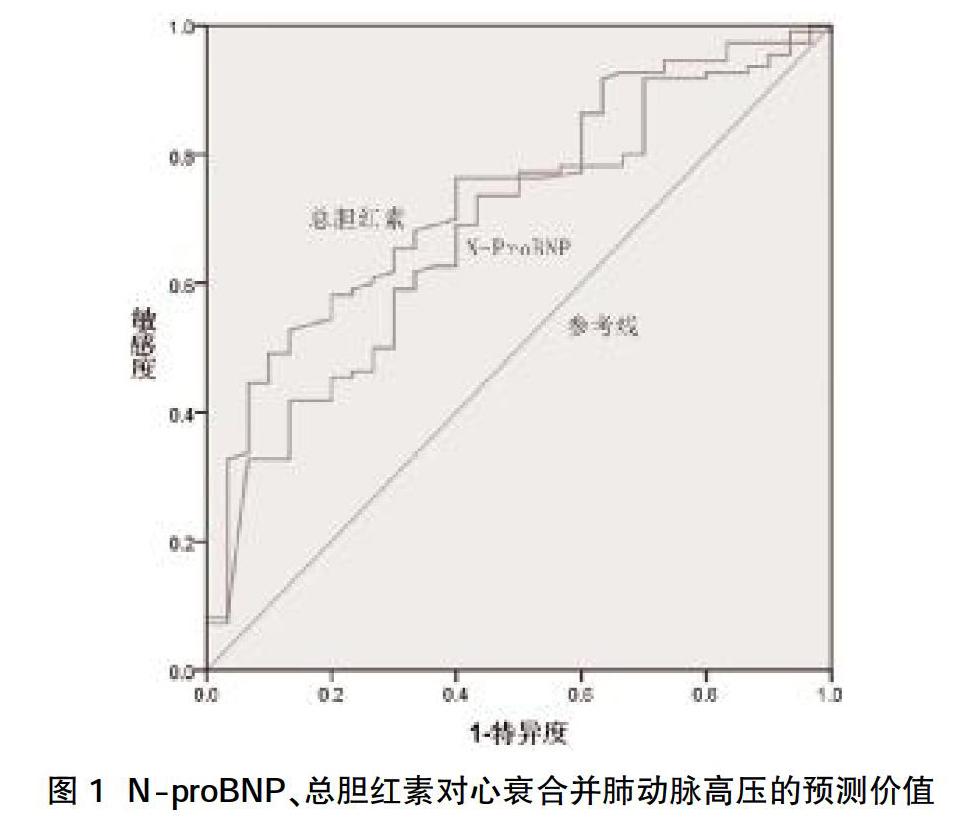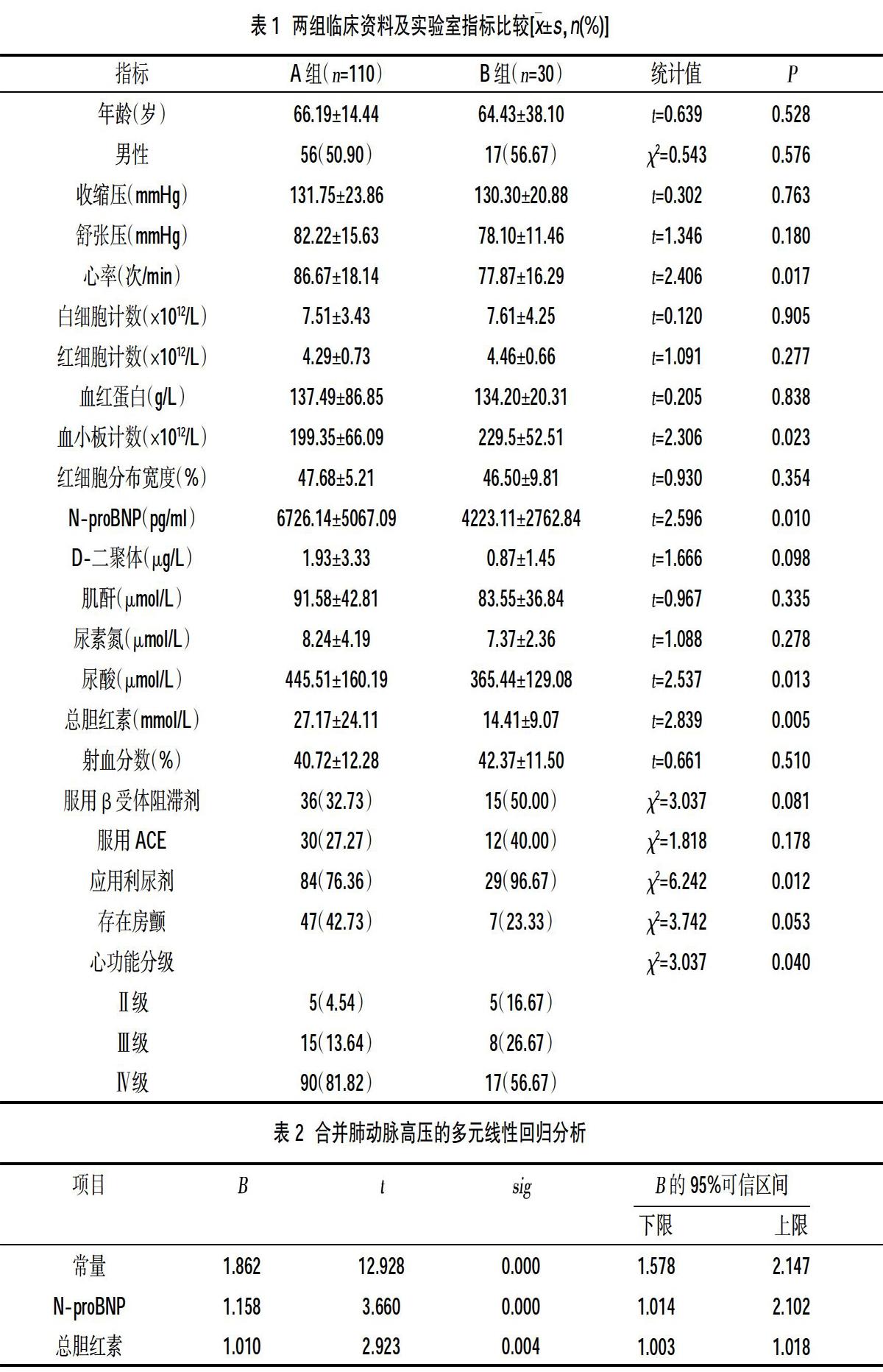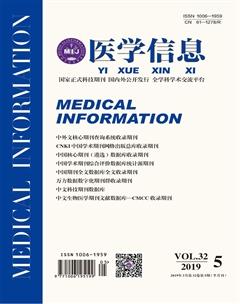N-proBNP对慢性心衰患者发生肺动脉高压的预测价值
韩婷婷 王虹 吴美美 杨利娇 李舒承


摘要:目的 探讨N-proBNP对慢性心力衰竭患者合并肺动脉高压的预测价值。方法 选取我院心脏科住院的140例心力衰竭患者,根据是否发生肺动脉高压,分为心衰合并肺动脉高压组110例及心衰未合并肺动脉高压组30例,收集临床资料及实验室指标,分析N-ProBNP水平对心衰发生肺动脉高压预测价值。结果 与未发生肺动脉高压相比,合并肺动脉高压组中N-proBNP、尿酸、总胆红素、心率、心功能分级差异有统计学有意义(P<0.05)。相关性分析显示,尿酸、总胆红素、心率、红细胞分布宽度、N-proBNP与肺动脉高压之间存在正相关(r=0.237、0.355、0.225、0.259、0.357,P<0.05),将其进行多元线性回归分析发现,总胆红素及N-proBNP与肺动脉高压独立相关。ROC曲线显示,N-proBNP对心衰合并肺动脉高压有很好的预测价值,曲线下面积为0.678。结论 N-ProBNP对心衰肺动发生脉高压有很好的预测价值。
关键词:慢性心力衰竭;肺动脉高压;N末端脑钠肽前体
中图分类号:R541.6 文献标識码:A DOI:10.3969/j.issn.1006-1959.2019.05.035
文章编号:1006-1959(2019)05-0114-03
Abstract:Objective To investigate the predictive value of N-proBNP in patients with chronic heart failure complicated with pulmonary hypertension. Methods A total of 140 patients with heart failure admitted to our department of cardiology were enrolled. According to whether pulmonary hypertension occurred, 110 patients with heart failure and pulmonary hypertension group and 30 patients with heart failure without pulmonary hypertension were collected. Clinical data and laboratory indicators were collected and analyzed. The predictive value of N-ProBNP levels for pulmonary hypertension in patients with heart failure. Results Compared with no pulmonary hypertension, the difference of N-proBNP, uric acid, total bilirubin, heart rate and cardiac function between the patients with pulmonary hypertension was statistically significant (P<0.05). Correlation analysis showed that there was a positive correlation between uric acid, total bilirubin, heart rate, red blood cell distribution width, N-proBNP and pulmonary hypertension (r=0.237, 0.355, 0.225, 0.259, 0.357, P<0.05). Multiple linear regression analysis found that total bilirubin and N-proBNP were independently associated with pulmonary hypertension. The ROC curve showed that N-proBNP has a good predictive value for heart failure combined with pulmonary hypertension, and the area under the curve is 0.678. Conclusion N-ProBNP has a good predictive value for pulmonary hypertension in patients with heart failure.
Key words:Chronic heart failure;Pulmonary hypertension;N-terminal pro-brain natriuretic peptide
慢性心力衰竭(chronic heart failure)是各种心脏疾病的终末阶段,随着疾病进展会出现不同程度的肺动脉高压。研究表明,慢性心力衰竭继发肺动脉高压患者短期及长期的不良风险可能达到40.3%,并且约2/3的心力衰竭患者可能继发肺动脉高压,这往往提示预后不良[1,2]。N-末端脑钠肽前体(N-proBNP)目前是心力衰竭病情评估、严重程度的敏感指标之一。研究表明,N-proBNP可作为肺动脉高压病情预测指标,将有望成为肺动脉高压严重的预测因子[3],但目前N-proBNP对心衰是否发生肺动脉高压的预测价值尚未报道。本研究旨在分析N-proBNP水平对慢性心力衰竭发生肺动脉高压的预测价值,现报道如下。

